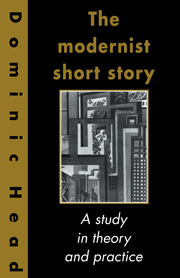Book contents
- Frontmatter
- Contents
- Preface
- Acknowledgements
- 1 The short story: theories and definitions
- 2 James Joyce: the non-epiphany principle
- 3 Virginia Woolf: experiments in genre
- 4 Katherine Mansfield: the impersonal short story
- 5 Wyndham Lewis: the Vorticist short story
- 6 Malcolm Lowry: expanding circles
- 7 Conclusion: contemporary issues
- Notes
- Bibliography
- Index
7 - Conclusion: contemporary issues
Published online by Cambridge University Press: 06 July 2010
- Frontmatter
- Contents
- Preface
- Acknowledgements
- 1 The short story: theories and definitions
- 2 James Joyce: the non-epiphany principle
- 3 Virginia Woolf: experiments in genre
- 4 Katherine Mansfield: the impersonal short story
- 5 Wyndham Lewis: the Vorticist short story
- 6 Malcolm Lowry: expanding circles
- 7 Conclusion: contemporary issues
- Notes
- Bibliography
- Index
Summary
Each of the major modernist figures discussed in the preceding chapters found the short story form amenable to his or her own personal literary innovations, and this indicates that the genre is of particular importance as a vehicle for modernist expression. Key features of modernist writing – particularly the cultivation of paradox and ambiguity, and the fragmented view of personal identity – find a well-suited outlet in the adapted materials of the conventional short story. Perhaps the most surprising discovery of this survey is the disjunction between the modernists' problematizing of the genre, and the continuing simplistic assumptions of short story theory: while there is a general consensus that figures such as Joyce and Mansfield have had a major impact on the development of the short story, that impact has not been properly registered in the generic theory, governed as it is by a simplistic emphasis on single effects, narrative stability and formal unity.
The overt literary artifice of the short story, its emphasis on technique, tallies with the concerns of the modernists, their pursuit of social ends through formal experimentation. The importance of form – not as an aesthetic end in itself, but as the means of defining broader, contextual goals – demands an interpretive methodology which acknowledges the interrelation between form and content, by viewing ‘form as the structure of a ceaseless self-production, and so…as “structuration”’.
- Type
- Chapter
- Information
- The Modernist Short StoryA Study in Theory and Practice, pp. 185 - 205Publisher: Cambridge University PressPrint publication year: 1992



